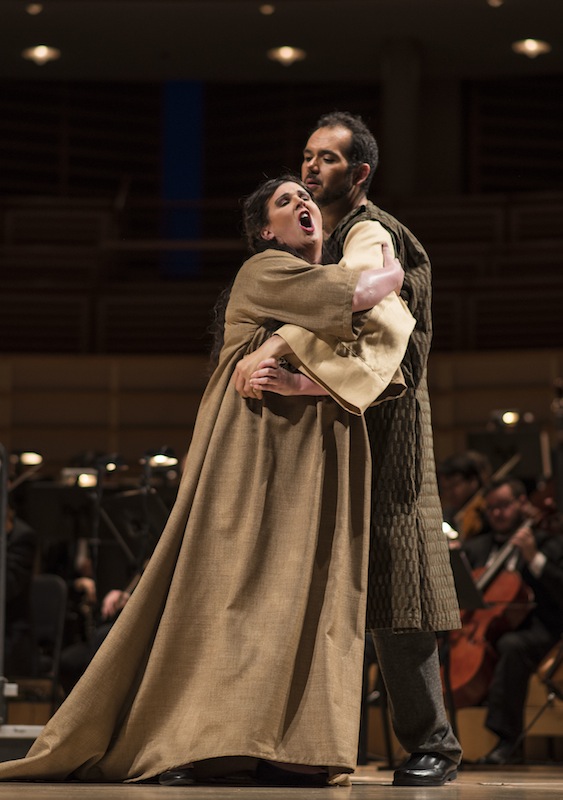Miami Music Festival serves up first-class Wagner singing

Elizabeth Baldwin and Dominic Armstrong in Act I of Wagner’s “Die Walkure” Saturday night at the Arsht center for the Miami Music Festival. Photo: Kristen Pulido.
For the second summer in a row the Miami Music Festival has filled South Florida’s long-running Wagner void with a program of highlights from the German master’s music dramas.
This year’s semi-staged concert was considerably more ambitious than the initial offering in 2016. An eager and highly enthusiastic audience was on hand Saturday at the Arsht Center for an evening of music (with one exception) from three of the Ring of the Nibelung operas, featuring students from the festival’s Miami Wagner Institute and veteran Wagnerians Christine Brewer and Alan Held.
The Prologue from Götterdämerung, the cataclysmic finale of the four opera cycle, introduced three impressive young singers as the Norns spinning the rope of fate. Two outstanding mezzos dominated the scene. Julia Benzinger’s warmth of timbre, silvery top register, and declamation were riveting. Rehanna Thelwell’s deep and powerful voice seemed to encompass pending doom from the start. Megan Nielson’s lighter soprano had admirable color or thrust, contrasting nicely with the two lower-voiced singers.
The enlarged student orchestra coped courageously and mostly successfully with Wagner’s music. Still, in Siegfried Rhine Journey, there was some unsteady wind playing with a particularly thin oboe solo. Festival founder Michael Rossi kept a steady hand on the proceedings and drew some sonorous playing from the brass.
Bradley Moore, who conducted the festival’s outstanding production of Robert Ward’s The Crucible last summer, took over the podium for solos from Das Rheingold and Lohengrin. Moore’s solid leadership and fine sense of instrumental balance provided firm instrumental underpinning for the singers. Kristine Dandavino had the low notes and contralto-like depth for Erda’s warning, “Weiche, Wotan, weiche” from Das Rheingold. However Dandavino’s pronounced vibrato needs to be kept under control. A few high notes went off the mark in tenor Matthew Arnold’s rendition of “In fernem Land” from Lohengrin but his lyric voice has weight and firmness.
Following intermission, the evening’s vocal heavyweights appeared in more substantial excerpts. The entire first act of Die Walküre was superbly staged by David Carl Toulson. To the opening storm music, Siegmund staggered in confusion across the choral risers in back of the orchestra. The warrior Hunding, spear in hand, patrolled the same turf before arriving on stage to find the exhausted stranger in his abode. His captive wife Sieglinde seemed at once delirious and overjoyed. There was real and palpable tension between the three protagonists and some first-class Wagnerian singing.
Dominic Armstrong has sung leading roles in Puccini and Bizet operas with regional companies but he is definitely a budding heldentenor with an authentic Wagnerian timbre and baritonal bottom. There is fervor is his declamation of the text and his high range is free of strain or harshness. Armstrong’s singing was nothing short of thrilling, capped by a subtly quiet “Winterstürm” that spanned the full lyrical spectrum.
Solomon Howard, who has already sung at the Met, had the dark bass and stentorian thrust for Hunding’s fiery outbursts. Elizabeth Baldwin was a rapturous Sieglinde. Her “Du bist der Lenz” was more lyrical reverie than ecstatic proclamation but there is refined steel in her top. Rossi did his best conducting of the night in this act, melding romanticism with agitated phrasing. This outstanding performance deservedly received the largest ovation of the evening.
The generous program concluded with the final Wotan-Brunhilde scene from Act II of Die Walküre with Brewer and Held who had coached the young singers. Although she looked decidedly campy in a costume and headdress (with horns) right out of the old Victor Book of the Opera, Brewer’s voice is still rich and luminous. Indeed one would have liked to hear more of her since this scene largely belongs to Wotan, Brunhilde’s father.
Held did not disappoint as Wotan. He brought tremendous authority to the god’s every utterance and tamed his powerful instrument for an eloquently phrased “Wotan Farewell.” From the risers, Held summoned Loge to create fire around the sleeping Brunhilde with Ron Burns’ lighting basking the stage in red – an appropriately eye-filling finale to a rewarding Wagner evening.
Posted in Uncategorized
Leave a Comment
Mon Jul 24, 2017
at 10:56 am
No Comments
